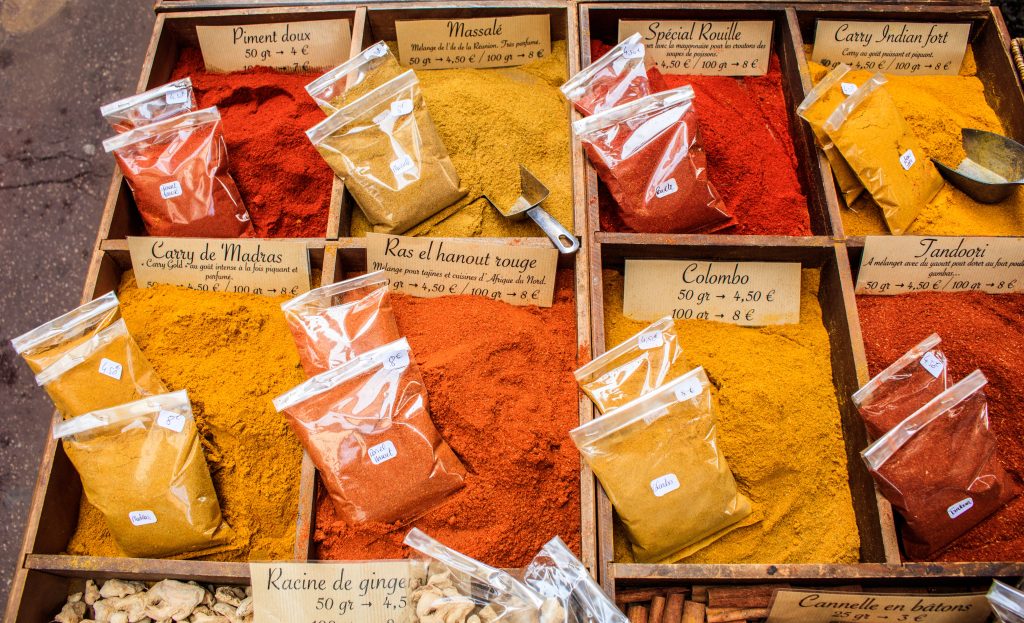Module 05: Bon appétit!
Troisième partie: L’art de la table ! Explication de grammaire
In this section:
-
-ir verbs (regular) present tense
-
boire, croire, voir
-
interrogative words: où, quand, comment…
-ir verbs (regular) present tense

Verbs with infinitives ending in -ir form a second group of regular verbs in French, often called ‘second conjugation’ verbs. To conjugate these verbs, drop the -ir from the infinitive and add the second conjugation present tense endings: -is, -is, -it, -issons, -issez, -issent. The singular and plural forms of the third person are clearly distinguishable (finit vs.finissent). Listen to the difference.
|
||||||||||
Here is a list of other common -ir verbs:
| choisir, to choose | voir, to see | réfléchir, to think, reflect | ||
| établir, to establish | savoir, to know | réunir, to get together, assemble | ||
| grandir, to grow (up) | obéir (à quelqu’un), to obey (someone) | réussir (à), to succeed (at) | ||
| grossir, to gain weight | réagir, to react | vieillir, to grow old |
Not all verbs ending in –ir follow this pattern, however. Irregular –ir verbs include ouvrir, partir, sortir, and dormir.
![]()
Listen carefully to the pronunciation of the verbs in the following dialogue. In particular, note the difference in the pronunciation of one s (pronounced as /z/) and two ss (pronounced as /s/) in the verb ‘choisir.’![]()
 boire, croire, voir
boire, croire, voir

The irregular verbs boire, croire, and voir have similar conjugations. Listen carefully to their forms in the present tense.
| boire ‘to drink’ | |
| je bois | nous buvons |
| tu bois | vous buvez |
| il/elle/iel/on boit | ils/elles/iels boivent |
| past participle : bu | |
| croire ‘to believe’ | |
| je crois | nous croyons |
| tu crois | vous croyez |
| il/elle/iel/on croit | ils/elles/iels croient |
| past participle : cru | |
| voir ‘to see’ | |
| je vois | nous voyons |
| tu vois | vous voyez |
| il/elle/iel/on voit | ils/elles/iels voient |
| past participle : vu | |
Here’s an example of using these verbs in the present tense:
| Je bois du café tous les matins.
Tu bois de l’eau pendant le repas. Elle croit en l’amour sincère. Nous croyons en la justice et à l’égalité. Il voit un arc-en-ciel après la pluie. Vous voyez les étoiles briller dans la nuit. |
I drink coffee every morning.
You drink water with your meal. She believes in true love. We believe in justice and equality. He sees a rainbow after the rain. You see the stars shining in the night. |
interrogative words: où, quand, comment…

Où (where), quand (when), comment (how), pourquoi (why), combien (how much), combien de (how many) may be used to ask questions with subject/verb inversion or with est-ce que. Note that the question word goes before est-ce que.
Read the following dialogue to see question words in context.
| Où est mon livre ? | Where’s my book? | |
| Où vas-tu ce soir ? | Where are you going tonight? | |
| Quand est ton anniversaire ? | When’s your birthday? | |
| Quand partons-nous en vacances ? | When do we go on vacation? | |
| Comment ça va ? | How are things? | |
| Comment fais-tu pour réussir ? | How do you succeed? | |
| Combien d’étudiants sont dans la classe ?
Combien d’amis seront invités ? |
How many students are in class?
How many friends will be invited? |
|


